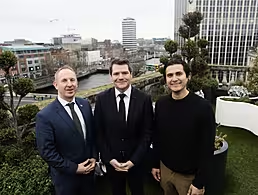Joy Shi, founder of Integirls, explains why she set up a competition to help inspire a love for maths and science in female students.
Joy Shi had recently graduated from high school when we got the chance to chat over the phone. She lives in Washington DC and had the “surreal” experience of graduating remotely. For Shi, her high school graduation wasn’t the only milestone that was moved online this year. Her latest Integirls event, a puzzle competition, had to be carried out virtually, too.
Shi set up Integirls when she was 16 and a half, she tells me. On her way home from a maths contest as one of three girls on her team – called the ‘Algebros’ – she knew she wanted to help more girls share her passion for the subject.
“I was trying to make a pun and then it just hit me: Integirls,” she says, explaining the name’s reference to integrals, a fundamental concept in calculus. “I realised that was what I wanted to call this passion project. And over the past one and a half years, this passion project has really grown into something bigger.”
Venturing beyond the boys’ club
Maths competitions had become a frequent fixture in Shi’s life as a teenager, though she had never expected that to happen. She joined her first maths team because the three other girls in her school carpool were attending their maths group’s meetings in the mornings. “So I just kind of tagged along. In the beginning, I was scared. I never though I would end up wanting to do it as a career,” she remembers.
Shi became more involved in the competitive maths scene, but wasn’t until her junior year in high school that she finally got to attend an all-girls contest: the Math Prize for Girls, an annual MIT-hosted event open to girls with the top 300 maths grades in the US and Canada. “Going to that event definitely opened my eyes because throughout my math competition years, I was used to being on teams with mostly boys.
‘Society kind of treats STEM as something that’s supposed to be hard for girls’
– JOY SHI
“When I was in the top 20 in the state, there were only three girls in the top 20. And I was one of them. Going to an event like Maths Prize for Girls, where all these girls would be just like me and they all liked math and were all talking about math-related things and our favourite formulas and things like that, it was just really, really awesome.”
Puzzling it out
Those experiences inspired Shi to bring an all-girls maths competition back home to DC, resulting in the birth of Integirls. There was a regional Integirls contest in 2019, but this year’s event was pivoted online because of the Covid-19 pandemic.
The event was changed to a puzzle competition to adapt it to a virtual world. “As I’ve done puzzles in the past month or two, I realised that puzzling and math have a lot in common in terms of problem-solving and using your brain in different ways,” Shi explains.
“I think puzzles and math are very similar. And it’s a better way to get a lot more girls interested in STEM because some girls, I think, are still kind of intimidated by math. There’s still that stigma around it. But the thing is, with our puzzles, 96pc of the girls that participated had never done a puzzle in their life.
“So, we had them participate in a puzzle show, introducing them to this kind of novel thing that they don’t really have any preconceived notions of, like they do with math. I think that also encouraged lot more girls to participate. And seeing the response, I think, just made everything else, all the work that we’ve put into Integirls, all worth it.”
Competition day
This year’s online event was held on a capture-the-flag platform, Shi tells me. With 600 girls from around the world – from Trinidad to Norway to New Zealand – refreshing the site at the same time, the website crashed and the Integirls team was forced to pull an all-nighter to get it working.
“So that was definitely a huge challenge that we faced,” Shi says. “There’s definitely a lot of improvising, I think, during those moments. I relied so much on my team. And I think, honestly, Integirls is really much more of a team effort than any one individual’s effort. My team really came together that day.
“I think it was a lot of work in a short period of time, a lot of stress. It kind of relates to releasing a product. If there’s a bug, you’ll have to assemble the entire team, probably work all night and try to get the bug fixed.
“I’ve learned so much running Integirls. Both of the events have been some of the most rewarding experiences of my life.”
Skills for the future
Teamwork is one of the skills that maths and puzzle competitions help bring out in people, Shi says. When she was taking part in relay rounds in contests, for example, teammates weren’t allowed to speak with one another. “There were three teammates and we would pass notes or their answers over. So we would have to know each other really well and know what each other is good at and which positions each person is best in.
“That way, we could solve the problem without even communicating. And I think that nowadays, especially in leadership, it’s really important to be able to understand each person’s strengths and be able to work in a team.
“I think math competitions definitely are a good way to train that. Math competitions are training your brain. Like, you would learn things and you would apply them. And every single problem that you do, that’ll help you with a future problem.
“And that’s why I really, really enjoy math competitions, because even though I’ve never been super ahead in school and learning, they would use not-so-complex ideas, but at the same time make it so that you would really have to think a long time to get the answer.
“I think in the future, whatever field I work in, I think it’ll be important to be able to use my brain in that way. So, if I encountered a problem, it would just mean using everything I’ve learned and all my experiences to solve that problem.”
Inviting girls to the conversation
At the end of our call, I ask Shi what she would like girls and women to know about getting involved in STEM and maths competitions in particular. She’s eager to emphasise her own journey again.
“I’m really glad I joined math team in middle school,” she says. “If I wasn’t part of that carpool, who knows where I’d be today. Just by having that team and making sure we encourage girls enough, I think, things will change. I think the stigma will go away after a while. I think girls will be less scared.
“And I think in the future we’ll see some changes, like in the demographics of the people and the leaders in Silicon Valley, for example. I think there will be more women there.
“It’s about getting over the fact that society kind of treats STEM as something that’s supposed to be hard for girls. Inviting them to these kinds of communities of STEM girls will definitely help them. Just like how Math Prize for Girls changed my life, I hope Integirls does that with other girls.”
The first annual inteGIRLS was a SUCCESS
? THANK YOU to our wonderful sponsors, panelists, guest speakers, participants, volunteers, parents, teachers, and MC faculty for making this event possible. We hope to see you all next year! ? pic.twitter.com/Ds5HTMZAWK
— inteGIRLS (@inteGIRLS) May 18, 2019
Want stories like this and more direct to your inbox? Sign up for Tech Trends, Silicon Republic’s weekly digest of need-to-know tech news.




